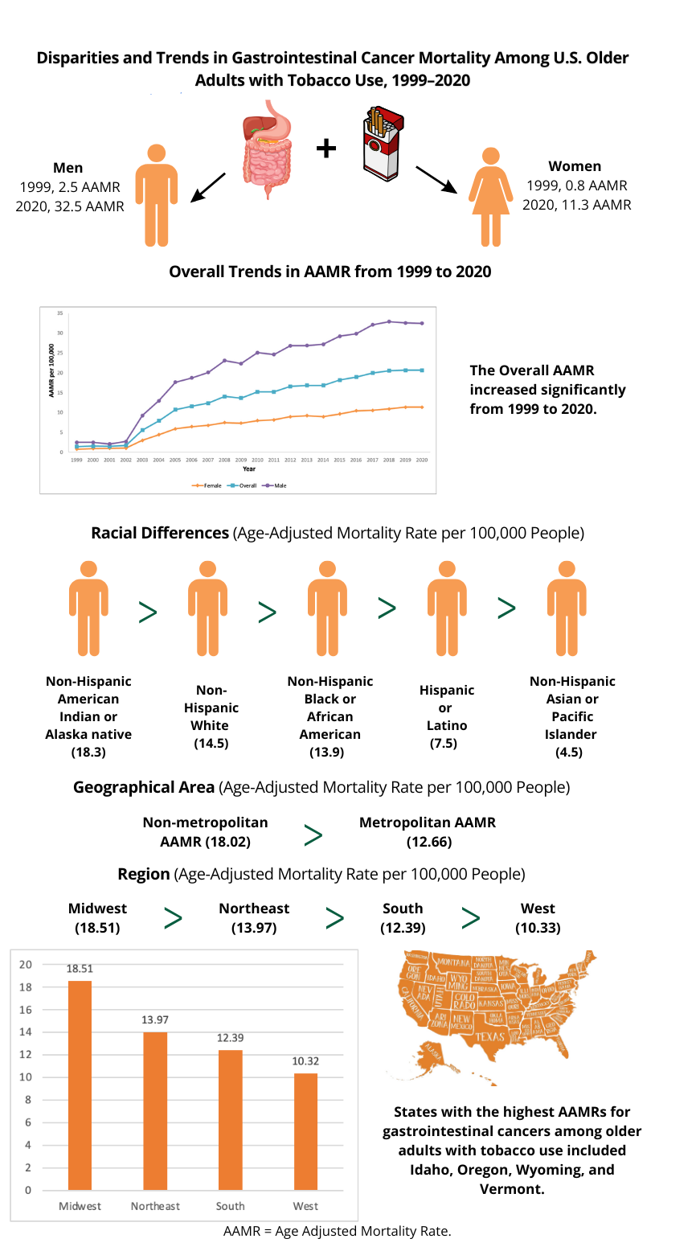Tuesday Poster Session
Category: Colorectal Cancer Prevention
P4806 - Disparities and Trends in Gastrointestinal Cancer Mortality Among US Older Adults With Tobacco Use, 1999–2020
Tuesday, October 28, 2025
10:30 AM - 4:00 PM PDT
Location: Exhibit Hall

Amine Rakab, MD (he/him/his)
Division of Medical Education, Weill Cornell Medicine
Doha, Ad Dawhah, Qatar
Presenting Author(s)
Award: ACG Presidential Poster Award
Muhammad Hamza Shuja, MD1, Qazi Shurjeel Uddin, MD2, Bisher Sawaf, MD3, Maliha Edhi, MD2, Amin Abu Hejleh, MD4, Fabeeha Shaheen, MD5, Amine Rakab, MD6, Mishal Abid, MD2, Ahmad Shahid, MD7, Minal Hasan, MD2, Ilsa Ahmed, MD2, Ramish Hannat, MD8
1Dow Medical College, Toledo, Azad Kashmir, Pakistan; 2Dow University of Health Sciences, Karachi, Sindh, Pakistan; 3The University of Toledo, Toledo, OH; 4Mohammed Bin Rashid University of Medicine and Health Sciences, Dubai, Dubai, United Arab Emirates; 5Jinnah Sindh Medical University, Karachi, Sindh, Pakistan; 6Division of Medical Education, Weill Cornell Medicine, Doha, Ad Dawhah, Qatar; 7Dow Medical College, Kashmir, Azad Kashmir, Pakistan; 8Services Institute of Medical Sciences, Lahore, Punjab, Pakistan
Introduction: Gastrointestinal tract (GIT) cancers remain a major contributor to morbidity and mortality, particularly in older adults. Tobacco use is a well-established carcinogen, and individuals who use tobacco may face elevated risks due to prolonged exposure and disparities in healthcare access. However, long-term mortality trends in this high-risk subgroup remain poorly characterized. This study evaluates national trends in GIT cancer mortality among U.S. adults aged ≥65 years with tobacco use from 1999 to 2020
Methods: Mortality data were obtained from the CDC WONDER Multiple Cause of Death database (1999–2020). Deaths among adults aged ≥65 years with GIT cancers (ICD-10 codes C15–C26) and documented tobacco use (ICD-10 code F17) were analyzed. Age-adjusted mortality rates (AAMRs) per 100,000 population were calculated using the 2000 U.S. standard population. Temporal trends were assessed using Joinpoint regression to estimate Annual Percent Change (APC) and Average Annual Percent Change (AAPC). Analyses were stratified by sex, race/ethnicity, U.S. Census region, and urban-rural status
Results: A total of 125,585 GIT cancer-related deaths were recorded among older adults with tobacco use. AAMRs showed a significant upward trend over the study period (AAPC = 16.26; 95% CI: 14.78–18.97; p < 0.01). Rates increased from 1.42 in 1999 to 10.73 in 2005 (APC = 52.63; 95% CI: 40.40–66.91), followed by a slower but sustained rise, reaching 20.64 in 2020 (APC = 4.27; 95% CI: 3.45–5.22). Males consistently exhibited higher AAMRs than females (22.23 vs. 7.28), although both sexes experienced similar upward trends (AAPC: 13.08 for males vs. 15.81 for females). Among racial and ethnic groups, Non-Hispanic American Indian/Alaska Native individuals had the highest AAMR (18.30), while Non-Hispanic Asian/Pacific Islanders had the lowest (4.48). Mortality rates were higher in rural compared to urban areas (18.02 vs. 12.66). Regionally, the Midwest (18.51) and Northeast (13.97) reported higher AAMRs than the West (10.33) and South (12.39). State-level analysis revealed the highest AAMR in North Dakota (34.93) and the lowest in California (1.35)
Discussion: GIT cancer mortality among older adults with tobacco use has increased over the past two decades. Notable disparities by sex, race/ethnicity, geography, and rurality highlight the urgent need for targeted public health strategies. Expanding tobacco cessation programs, improving access to screening, and addressing healthcare gaps are essential to reducing mortality

Figure: Figure: Disparities and Trends in Gastrointestinal Cancer Mortality Among U.S. Older Adults with Tobacco Use, 1999-2020
Disclosures:
Muhammad Hamza Shuja indicated no relevant financial relationships.
Qazi Shurjeel Uddin indicated no relevant financial relationships.
Bisher Sawaf indicated no relevant financial relationships.
Maliha Edhi indicated no relevant financial relationships.
Amin Abu Hejleh indicated no relevant financial relationships.
Fabeeha Shaheen indicated no relevant financial relationships.
Amine Rakab indicated no relevant financial relationships.
Mishal Abid indicated no relevant financial relationships.
Ahmad Shahid indicated no relevant financial relationships.
Minal Hasan indicated no relevant financial relationships.
Ilsa Ahmed indicated no relevant financial relationships.
Ramish Hannat indicated no relevant financial relationships.
Muhammad Hamza Shuja, MD1, Qazi Shurjeel Uddin, MD2, Bisher Sawaf, MD3, Maliha Edhi, MD2, Amin Abu Hejleh, MD4, Fabeeha Shaheen, MD5, Amine Rakab, MD6, Mishal Abid, MD2, Ahmad Shahid, MD7, Minal Hasan, MD2, Ilsa Ahmed, MD2, Ramish Hannat, MD8. P4806 - Disparities and Trends in Gastrointestinal Cancer Mortality Among US Older Adults With Tobacco Use, 1999–2020, ACG 2025 Annual Scientific Meeting Abstracts. Phoenix, AZ: American College of Gastroenterology.
Muhammad Hamza Shuja, MD1, Qazi Shurjeel Uddin, MD2, Bisher Sawaf, MD3, Maliha Edhi, MD2, Amin Abu Hejleh, MD4, Fabeeha Shaheen, MD5, Amine Rakab, MD6, Mishal Abid, MD2, Ahmad Shahid, MD7, Minal Hasan, MD2, Ilsa Ahmed, MD2, Ramish Hannat, MD8
1Dow Medical College, Toledo, Azad Kashmir, Pakistan; 2Dow University of Health Sciences, Karachi, Sindh, Pakistan; 3The University of Toledo, Toledo, OH; 4Mohammed Bin Rashid University of Medicine and Health Sciences, Dubai, Dubai, United Arab Emirates; 5Jinnah Sindh Medical University, Karachi, Sindh, Pakistan; 6Division of Medical Education, Weill Cornell Medicine, Doha, Ad Dawhah, Qatar; 7Dow Medical College, Kashmir, Azad Kashmir, Pakistan; 8Services Institute of Medical Sciences, Lahore, Punjab, Pakistan
Introduction: Gastrointestinal tract (GIT) cancers remain a major contributor to morbidity and mortality, particularly in older adults. Tobacco use is a well-established carcinogen, and individuals who use tobacco may face elevated risks due to prolonged exposure and disparities in healthcare access. However, long-term mortality trends in this high-risk subgroup remain poorly characterized. This study evaluates national trends in GIT cancer mortality among U.S. adults aged ≥65 years with tobacco use from 1999 to 2020
Methods: Mortality data were obtained from the CDC WONDER Multiple Cause of Death database (1999–2020). Deaths among adults aged ≥65 years with GIT cancers (ICD-10 codes C15–C26) and documented tobacco use (ICD-10 code F17) were analyzed. Age-adjusted mortality rates (AAMRs) per 100,000 population were calculated using the 2000 U.S. standard population. Temporal trends were assessed using Joinpoint regression to estimate Annual Percent Change (APC) and Average Annual Percent Change (AAPC). Analyses were stratified by sex, race/ethnicity, U.S. Census region, and urban-rural status
Results: A total of 125,585 GIT cancer-related deaths were recorded among older adults with tobacco use. AAMRs showed a significant upward trend over the study period (AAPC = 16.26; 95% CI: 14.78–18.97; p < 0.01). Rates increased from 1.42 in 1999 to 10.73 in 2005 (APC = 52.63; 95% CI: 40.40–66.91), followed by a slower but sustained rise, reaching 20.64 in 2020 (APC = 4.27; 95% CI: 3.45–5.22). Males consistently exhibited higher AAMRs than females (22.23 vs. 7.28), although both sexes experienced similar upward trends (AAPC: 13.08 for males vs. 15.81 for females). Among racial and ethnic groups, Non-Hispanic American Indian/Alaska Native individuals had the highest AAMR (18.30), while Non-Hispanic Asian/Pacific Islanders had the lowest (4.48). Mortality rates were higher in rural compared to urban areas (18.02 vs. 12.66). Regionally, the Midwest (18.51) and Northeast (13.97) reported higher AAMRs than the West (10.33) and South (12.39). State-level analysis revealed the highest AAMR in North Dakota (34.93) and the lowest in California (1.35)
Discussion: GIT cancer mortality among older adults with tobacco use has increased over the past two decades. Notable disparities by sex, race/ethnicity, geography, and rurality highlight the urgent need for targeted public health strategies. Expanding tobacco cessation programs, improving access to screening, and addressing healthcare gaps are essential to reducing mortality

Figure: Figure: Disparities and Trends in Gastrointestinal Cancer Mortality Among U.S. Older Adults with Tobacco Use, 1999-2020
Disclosures:
Muhammad Hamza Shuja indicated no relevant financial relationships.
Qazi Shurjeel Uddin indicated no relevant financial relationships.
Bisher Sawaf indicated no relevant financial relationships.
Maliha Edhi indicated no relevant financial relationships.
Amin Abu Hejleh indicated no relevant financial relationships.
Fabeeha Shaheen indicated no relevant financial relationships.
Amine Rakab indicated no relevant financial relationships.
Mishal Abid indicated no relevant financial relationships.
Ahmad Shahid indicated no relevant financial relationships.
Minal Hasan indicated no relevant financial relationships.
Ilsa Ahmed indicated no relevant financial relationships.
Ramish Hannat indicated no relevant financial relationships.
Muhammad Hamza Shuja, MD1, Qazi Shurjeel Uddin, MD2, Bisher Sawaf, MD3, Maliha Edhi, MD2, Amin Abu Hejleh, MD4, Fabeeha Shaheen, MD5, Amine Rakab, MD6, Mishal Abid, MD2, Ahmad Shahid, MD7, Minal Hasan, MD2, Ilsa Ahmed, MD2, Ramish Hannat, MD8. P4806 - Disparities and Trends in Gastrointestinal Cancer Mortality Among US Older Adults With Tobacco Use, 1999–2020, ACG 2025 Annual Scientific Meeting Abstracts. Phoenix, AZ: American College of Gastroenterology.

